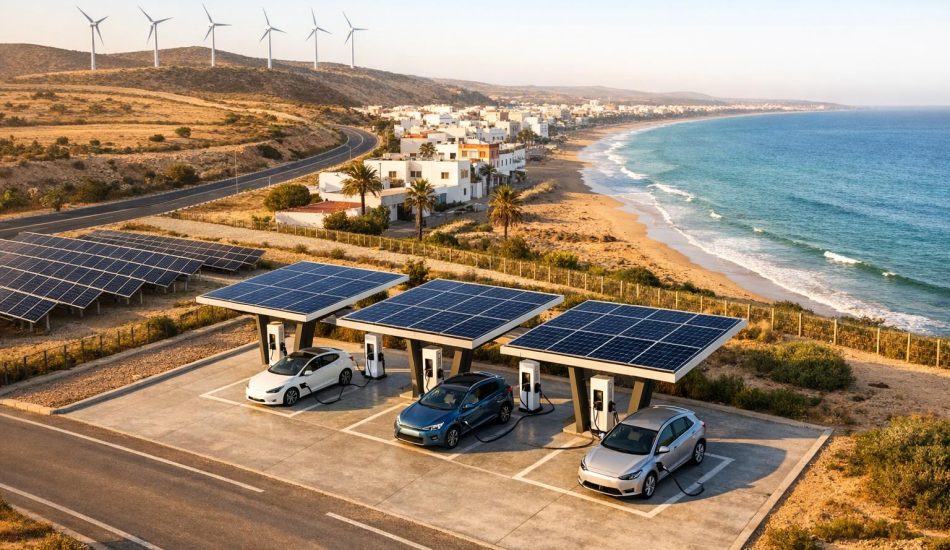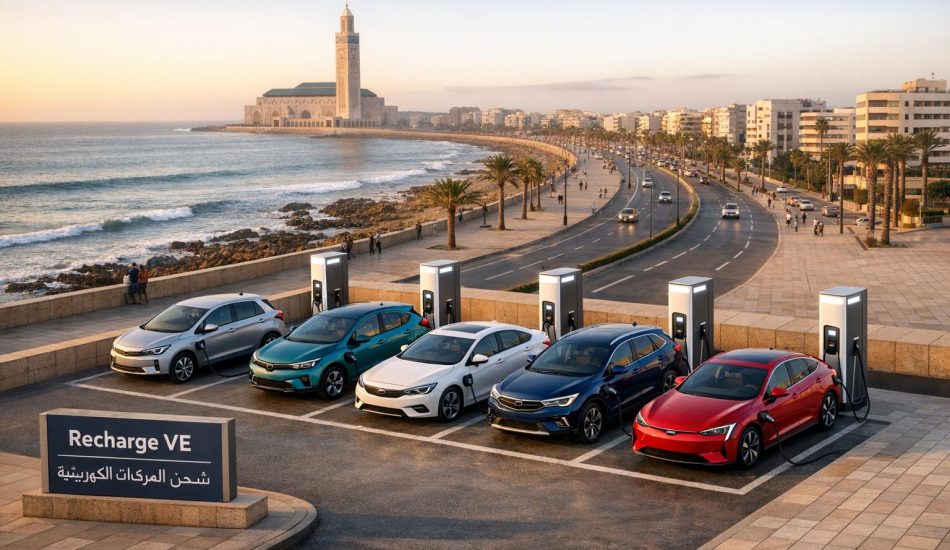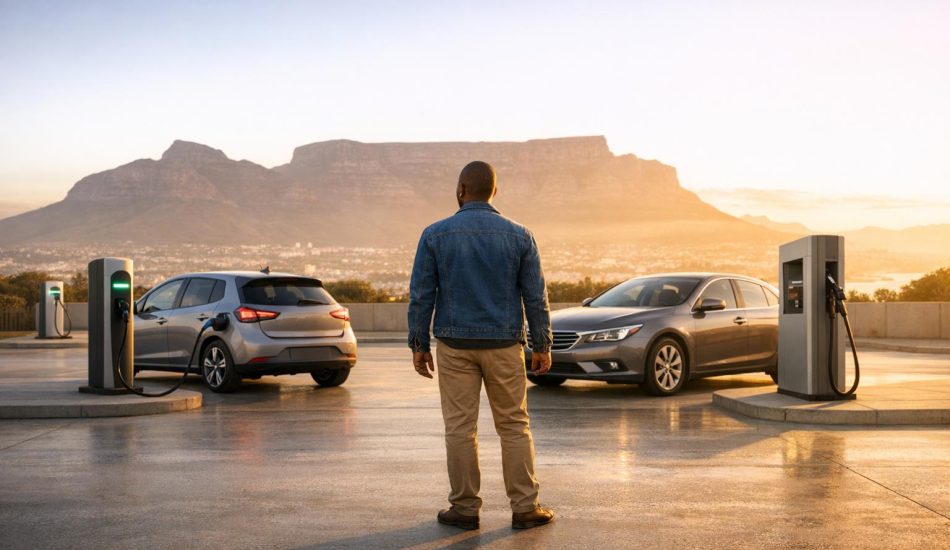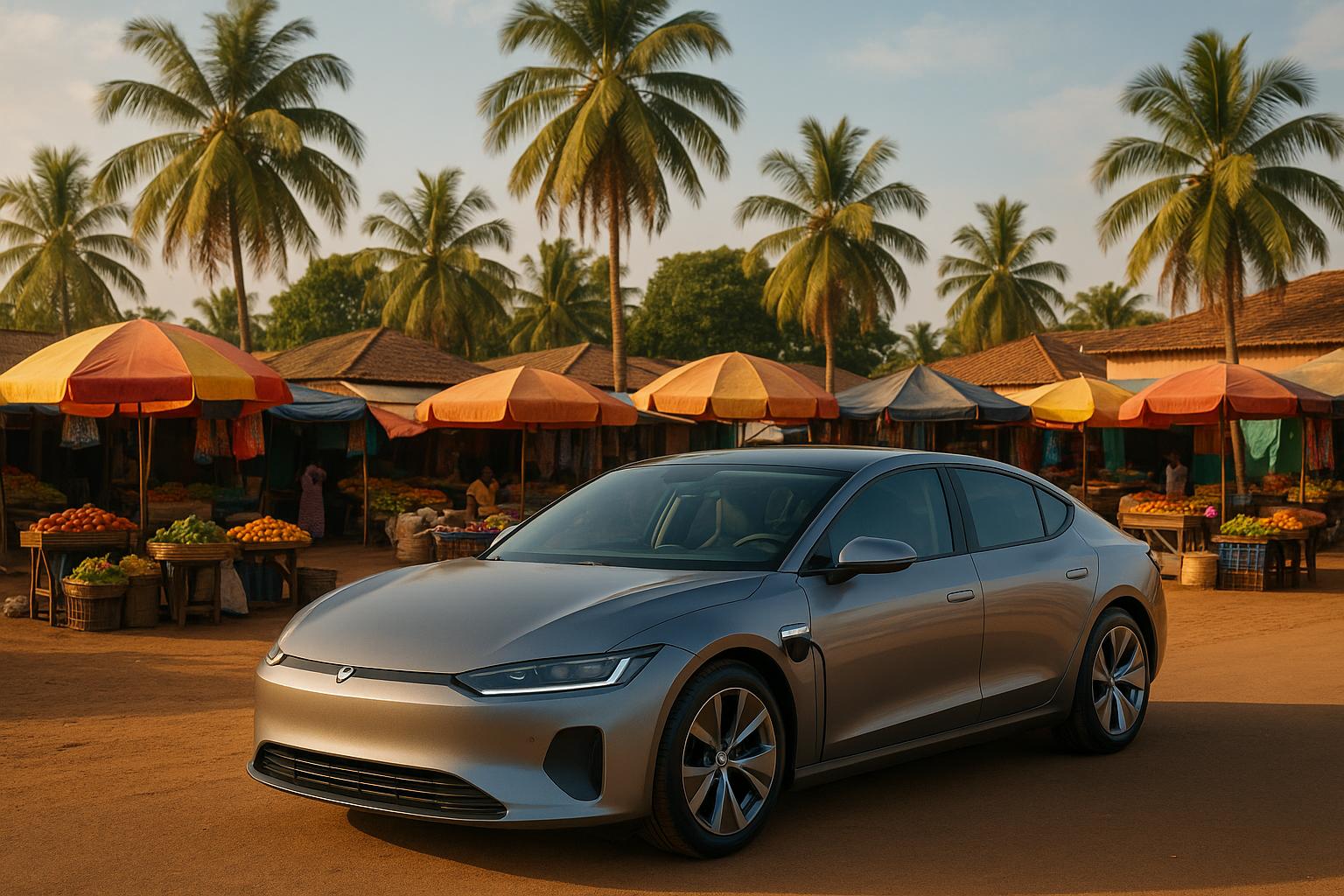
Electric cars are gaining traction in Guinea-Bissau in 2025. With rising fuel costs and the country’s potential for solar energy, EVs are becoming a practical alternative for transportation. While the market is still developing, platforms like EV24.africa are making it easier to purchase and import electric vehicles, offering a range of new and used models from brands like Tesla, BYD, and Hyundai.
Here’s what you need to know:
- Top Models: Tesla Model 3, BYD Seal, Hyundai Kona Electric, and Leapmotor C11 are popular choices, offering ranges from 258 to 435 miles and starting prices between $20,000 and $50,000.
- Charging Options: Limited public charging infrastructure means most owners rely on home charging, with solar-powered solutions being a viable option.
- Costs: EVs have higher upfront costs but lower maintenance and fuel expenses compared to gasoline cars. Import duties and the lack of government incentives add to the price.
- Delivery: Services like EV24.africa handle shipping, customs, and delivery, with timelines of 4 to 8 weeks.
Electric cars offer lower running costs, less maintenance, and align with Guinea-Bissau’s renewable energy potential, making them a smart choice for 2025.
Overlanding all-electric through Guinea Bissau and Guinee
Electric Vehicle Market in Guinea-Bissau: Current State
Guinea-Bissau’s electric vehicle (EV) market is still in its early stages but mirrors the broader growth patterns seen across Africa. Understanding the current trends in adoption, infrastructure, and policies provides a clearer picture of the opportunities and challenges in this emerging sector.
EV Adoption Rates and Market Growth
Africa’s EV market hit $15.94 billion in 2024 and is projected to grow at an annual rate of 10.26%, with over 5 million EVs expected on the continent’s roads by 2030 – provided infrastructure continues to improve. Guinea-Bissau, likely grouped within the "Rest of Middle East and Africa" category, is part of a region forecasted to see a 300% increase in light-duty vehicle stock, reaching 0.3 billion units by 2035.
Battery Electric Vehicles (BEVs) lead the way, accounting for 62.5% of EV sales across Africa in 2024. Passenger cars dominate the market, making up 57.4% of EV registrations in the same year. However, the commercial vehicle sector is quickly gaining momentum, with an anticipated growth rate of 18.3% between 2025 and 2033. These trends highlight a growing interest in EVs, but local infrastructure remains a critical factor in determining how quickly Guinea-Bissau can adopt this technology.
Charging Infrastructure and Local Challenges
One of the main hurdles for EV adoption in Guinea-Bissau is the country’s limited grid coverage, particularly in rural areas. Across Africa, renewable microgrids paired with charging stations have become vital for enabling EV use in off-grid and peri-urban areas. In urban centers like Bissau, the existing electrical infrastructure may support basic charging needs, making these areas more likely to see early EV adoption.
Urban logistics and ride-hailing services are also driving the rapid growth of two- and three-wheeled electric vehicles in Africa. For Guinea-Bissau, solar-powered charging stations and mobile charging units could be game-changers, helping to address the unique challenges posed by the country’s geography and infrastructure limitations.
Government Policies and Tax Incentives
Guinea-Bissau currently lacks specific policies or incentives to encourage EV adoption. This absence of government support adds to the financial burden for potential buyers, as they must evaluate EV purchases without the benefit of subsidies or tax breaks. Elsewhere in Africa, governments are beginning to recognize the importance of EV-friendly policies, and similar measures could significantly impact Guinea-Bissau’s adoption rates. For now, prospective EV owners in the country must carefully weigh the total cost of ownership when considering an electric vehicle.
Electric Car Models and Specifications Available
EV24.africa is making electric vehicles (EVs) accessible to a wider audience in Guinea-Bissau by offering a variety of options to suit different budgets and preferences. Whether you’re looking for a luxury ride or a practical everyday car, the platform connects buyers with both new and used EVs from trusted manufacturers, helping more people embrace the benefits of electric mobility.
Top Electric Car Models in Guinea-Bissau
Tesla leads the pack with cutting-edge models like the Model 3 and Model Y. These cars are perfect for urban areas in Guinea-Bissau, offering advanced autopilot features and over-the-air updates that enhance long-term usability and convenience.
BYD, a major player from China, has gained popularity across Africa with models like the BYD Seal and BYD Atto 3. These vehicles combine affordability, durable construction, and reliable batteries, making them ideal for Guinea-Bissau’s diverse road conditions.
Leapmotor offers a budget-friendly entry into the EV market. Their compact cars are designed for practicality, making them a great fit for Bissau’s narrow streets and daily commutes. With a focus on simplicity rather than luxury, Leapmotor keeps costs manageable for first-time EV buyers.
Other notable brands include ROX and Dongfeng, which provide mid-range options that balance performance with affordability. These brands also tend to offer solid warranties and straightforward maintenance, which is particularly appealing in regions where EV service infrastructure is still growing.
Additionally, Hyundai, Toyota, and Suzuki have EV models available through EV24.africa. These brands bring the reliability of established dealer networks, though their EV offerings may be less readily available compared to newer, EV-focused manufacturers.
Model Specifications Comparison
| Model | Range (miles) | Battery Capacity (kWh) | Charging Time (0-80%) | Seating | Starting Price Range |
|---|---|---|---|---|---|
| Tesla Model 3 | 272-358 | 60-82 | 31 minutes | 5 | $35,000-$50,000 |
| BYD Seal | 323-435 | 61.4-82.5 | 30 minutes | 5 | $25,000-$35,000 |
| BYD Atto 3 | 261-298 | 49.9-60.5 | 29 minutes | 5 | $22,000-$28,000 |
| Leapmotor C11 | 342 | 78.5 | 36 minutes | 5 | $20,000-$26,000 |
| Hyundai Kona Electric | 258 | 64 | 43 minutes | 5 | $28,000-$32,000 |
Charging time is a key feature for future-proofing your purchase, even if fast-charging networks are not yet widespread. Meanwhile, battery capacity directly impacts range and charging flexibility, offering peace of mind for longer trips or irregular charging schedules.
Most models comfortably seat five passengers, making them suitable for typical families in Guinea-Bissau. The price ranges reflect both new and used options, with used vehicles often costing 30-50% less than their new counterparts.
New vs Used Electric Cars: What to Choose
New EVs come with the latest technology, full warranties, and maximum battery life. For buyers in Guinea-Bissau, these features provide confidence and access to the newest safety advancements. However, higher upfront costs and potential delivery delays can make new cars less accessible.
Used EVs, on the other hand, offer substantial savings and are a smart choice for first-time buyers. Modern EVs tend to retain 85-95% of their range after five years, and they bypass the steepest depreciation period. Brands like Tesla and BYD are particularly good options, as they hold their value well and have established service records.
When deciding between new and used, consider your budget and comfort with risk. Used EVs often come with 8-year or 100,000-mile battery warranties, which cover the most expensive repairs and make them appealing for cost-conscious buyers.
Guinea-Bissau’s warm climate is another plus for EV owners, as moderate temperatures are easier on batteries compared to extreme cold. This means used EVs imported from similar climates are likely to perform better over time than those from colder regions.
These options lay the groundwork for evaluating costs and delivery logistics in later sections.
Electric Car Prices and Ownership Costs in 2025
When considering electric vehicles (EVs), it’s not just about the sticker price. The total cost of ownership plays a big role. While EVs often come with a hefty upfront price tag, their lower fuel and maintenance costs can lead to significant savings over time.
What Influences Electric Car Prices?
Several key factors affect the cost of EVs in Guinea-Bissau:
- Import Duties and Tariffs: Imported vehicles are subject to tariffs ranging from 20% to 40%, depending on their type and age. Newer, more fuel-efficient models tend to face lower rates.
- Lack of EV-Specific Incentives: Unlike some countries, Guinea-Bissau does not offer tax breaks or incentives specifically for EVs. This means buyers face the same tariffs as they would for traditional gasoline-powered vehicles.
- Regional Trade Agreements: As part of the West African Economic and Monetary Union (WAEMU), Guinea-Bissau follows a Common External Tariff system. Additionally, under the ECOWAS Trade Liberalization Scheme, ECOWAS members enjoy reduced tariffs if origin requirements are met.
Electric vs. Gasoline Vehicles: A Cost Comparison
Even though EVs demand a higher upfront investment, they can save owners money in the long run. Unlike gasoline cars, EVs don’t require oil changes or many of the mechanical repairs associated with internal combustion engines. These savings are especially important in Guinea-Bissau, where the average per capita income was around USD 800 in 2023.
Up next, we’ll look at how these costs tie into delivery timelines and purchasing options.
sbb-itb-99e19e3
Charging Setup and Delivery Options
Getting your EV ready for use starts with planning its charging setup and delivery. For most EV owners, home charging is the go-to option. While public charging stations are starting to pop up in urban areas, the availability of fast chargers is still limited. To make things easier, EV24.africa ensures that every vehicle meets local charging standards, combining technical compatibility with an efficient delivery process.
EV24.africa Delivery Services
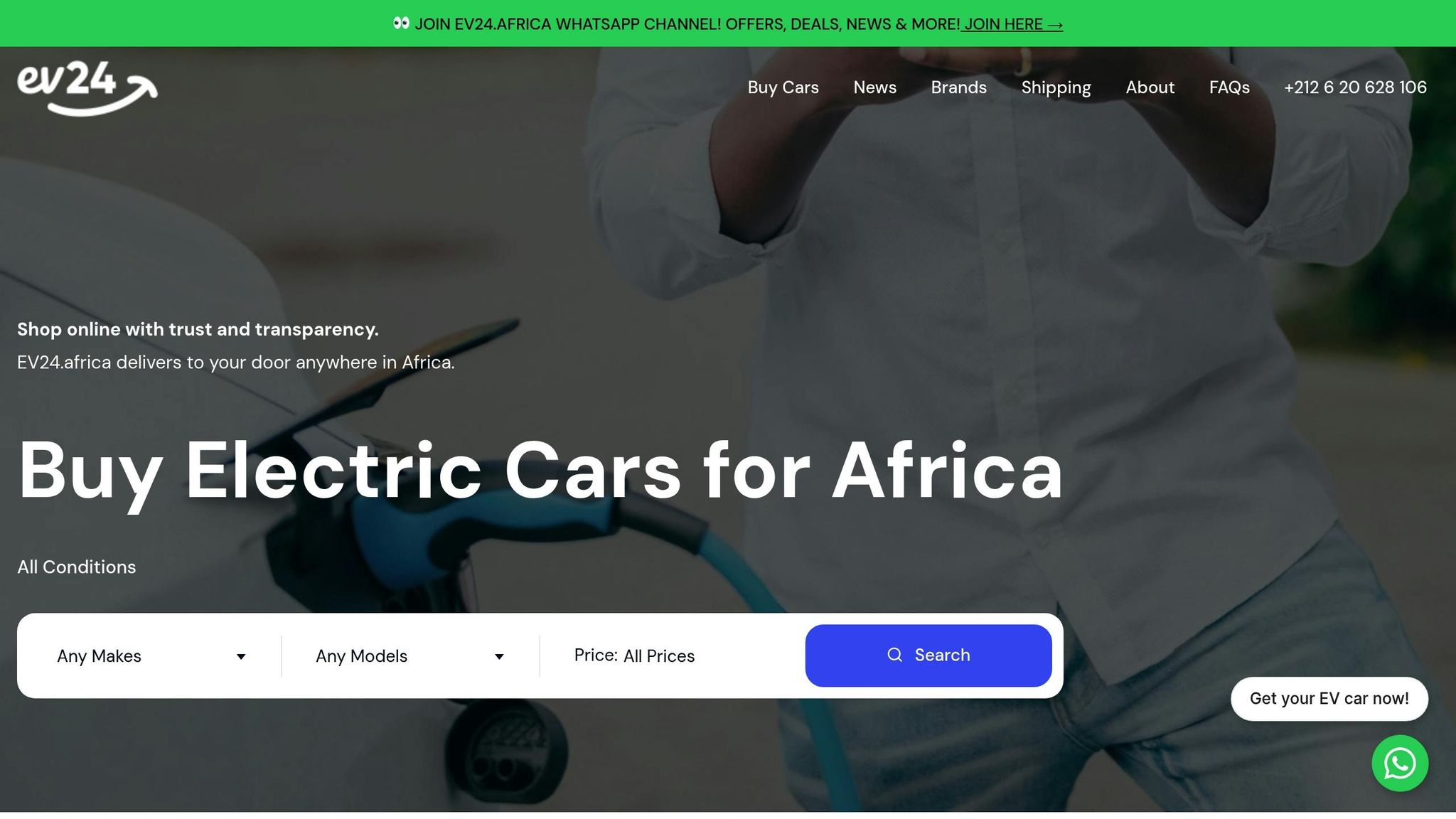
When it comes to delivery, EV24.africa has you covered across Guinea-Bissau and 54 other African countries. Through trusted local logistics partners, they handle every step of the process – from shipping and navigating customs to the final handover of your vehicle. This approach ensures your EV arrives safely, with minimal hassle.
Delivery Costs and Timeline Estimates
Delivery costs and timelines depend on factors like your location and where the vehicle is being shipped from. EV24.africa provides clear pricing and timeline estimates during the purchasing process, so you know exactly what to expect.
How to Buy Electric Cars Through EV24.africa
Purchasing an electric vehicle through EV24.africa takes the hassle out of the import process. The platform streamlines everything – from sourcing the vehicle to clearing customs – making EV ownership more accessible in Guinea-Bissau’s major cities like Bissau and Gabú.
Step-by-Step Purchase Process
Start by exploring EV24.africa’s extensive catalog of new and pre-owned electric vehicles. The selection includes major brands like Tesla, BYD, Volkswagen, XPeng, Mercedes-Benz, Citroën, and Peugeot, with vehicles sourced from Europe, Asia, North America, and Japan.
Once you’ve picked your model, place your order online and choose between port-to-port or door-to-door delivery. For buyers in Guinea-Bissau, vehicles are typically delivered through the Port of Bissau. Delivery operates under international commercial terms like Delivered Duty Paid (DDP) or Free on Board (FOB), depending on your budget and preference. Most orders are fulfilled within 4 to 8 weeks, and with transparent pricing, there are no unexpected costs.
If you’re considering financing, make sure to prepare all required documents, such as proof of income, identification, and bank statements. Accurate documentation is key to avoiding delays in the process.
Customer Support Services
EV24.africa’s customer support team is there to guide you every step of the way. They can help you choose the right vehicle based on Guinea-Bissau’s infrastructure and your specific needs. You’ll also have access to verified customer reviews, offering insights from other buyers across Africa.
The platform partners with local and international financial institutions to provide flexible financing options, such as leasing or loans. The support team assists with pre-approval processes and explains financing terms in detail.
For ongoing updates, deals, and expert advice, you can join EV24.africa’s WhatsApp channel. If you have more formal inquiries or technical questions, their dedicated email support at [email protected] is available.
The support doesn’t end at purchase. The team also helps with customs clearance, vehicle registration, and import tax calculations, ensuring compliance with Guinea-Bissau’s regulations. This comprehensive approach addresses the unique challenges of importing vehicles in West Africa.
Warranty and Maintenance Services
Long-term care for your EV is just as important as the purchase itself. Warranty coverage varies by vehicle and typically includes both manufacturer and battery warranties, with durations ranging from 3 to 5 years. Be sure to check whether warranty services are available locally or require coordination with regional service centers.
For pre-owned vehicles, EV24.africa offers certified used EVs with warranties, giving you added peace of mind. The platform also connects buyers with authorized service centers and local technicians trained in EV maintenance.
Electric vehicles generally require less upkeep than traditional cars. Key maintenance tasks include monitoring battery health, maintaining tire pressure, and performing software updates. EV24.africa provides resources to help you care for your vehicle and assists with sourcing genuine parts when needed.
Many modern EVs come with remote diagnostics capabilities, allowing technical issues to be identified – and sometimes resolved – without needing a physical service visit. This feature is particularly useful in Guinea-Bissau, where access to specialized EV service centers may be limited in rural areas.
To ensure your vehicle stays in top condition, EV24.africa offers scheduled maintenance packages and connects you with regional service partners. This support helps you enjoy a smooth ownership experience while benefiting from the long-term savings of EV ownership.
Key Points for Guinea-Bissau EV Buyers in 2025
For those considering an electric vehicle (EV) in Guinea-Bissau in 2025, here are the essential details to keep in mind. The growing EV market offers exciting opportunities, and EV24.africa provides a comprehensive managed service to simplify the process – from sourcing to dependable shipping.
With EV24.africa, you get transparent pricing – no hidden costs, so you’ll know exactly what you’re paying. Plus, their flexible financing options make it easier to own an EV without needing a significant upfront investment.
Their catalog includes a wide selection of new and pre-owned EVs from leading brands, catering to various budgets and driving needs.
To top it off, EV24.africa ensures expert service and ongoing support, making the transition to EV ownership seamless and worry-free.
FAQs
What challenges come with owning an electric car in Guinea-Bissau, and how can they be solved?
Owning an electric vehicle (EV) in Guinea-Bissau presents some notable hurdles, such as steep initial costs, a lack of widespread charging infrastructure, and an unstable electricity supply. These challenges can make it tougher for residents to embrace EVs.
Potential solutions include promoting local production to reduce vehicle prices, establishing cost-effective charging stations in convenient areas, and incorporating solar power and other renewable energy sources to improve the reliability of the electricity grid. These steps could make EV ownership more accessible and practical for people in Guinea-Bissau.
How does EV24.africa make sure electric cars work with Guinea-Bissau’s charging infrastructure?
EV24.africa takes the guesswork out of owning an electric car in Guinea-Bissau by ensuring compatibility with the country’s existing charging infrastructure. They carefully assess the local charging standards and network, guiding customers to select vehicles that work smoothly within these parameters.
On top of that, EV24.africa offers practical tips on charging options tailored to the region’s infrastructure. This helps buyers stay informed and ready as the electric vehicle ecosystem continues to develop in Guinea-Bissau.
What financing options are available for buying an electric car through EV24.africa, and what documents do I need?
EV24.africa makes it easier for buyers in Guinea-Bissau to own an electric car by offering flexible financing options. These include installment plans and other payment methods tailored to suit varying budgets, ensuring a more accessible purchasing experience.
When you’re ready to finalize your purchase, you’ll generally need the following documents:
- Identification: A passport or national ID
- Commercial invoice
- Bill of lading
- Import declaration form
In some cases, additional documentation might be required depending on the financing or import procedures. This could include proof of income, bank statements, a valid insurance policy, and an official vehicle quotation. It’s a good idea to confirm all necessary paperwork ahead of time to keep the process hassle-free.


